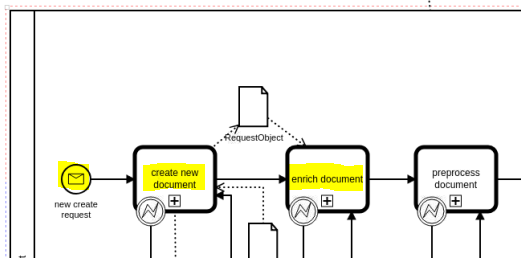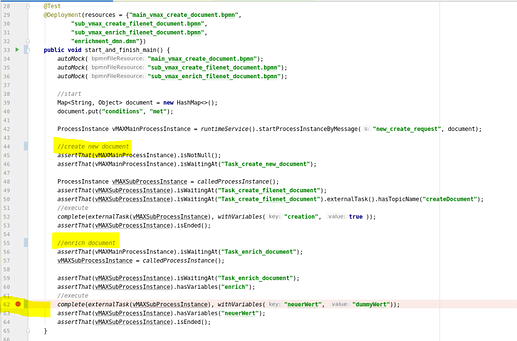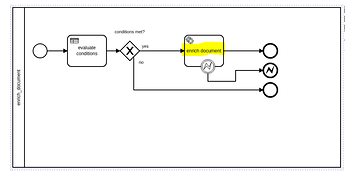Hi all,
I’d like to write an unit test for the following case:

I created namely a chain of steps to model the workflow creation of a new document.
I named it ‘process_create_new_document’
I’m using:

Unfortunately it seems not to work as I expected:
-
between the lines 43 and 53 it works all as expected and the token leaves the first activity create new document
-
between the lines 56 and 60 the token enters the subprocess enrich document and stopps just before an external task:
-
then I cannot go forward and the instruction:
complete(externalTask(vMAXSubProcessInstance), withVariables("neuerWert", "dummyWert"));
fails with the following exception:
This is strange to me because the ‘process_create_new_document’ did work, at least until the line 62…
The same subprocess enrich document can I succesfully test in a separated and dedicated unit test…
So I suspect my approach to test such chains of call activities is basically wrong or at least not supported by camunda-bpm-assert… 
Do you have a tip about a better strategy to organize my tests? I would like to get a top down structure in oder to simplify a complex workflow by dividing it in a group of little ones…
Thank you so much in advance!
Regards
Fabio
Hi all,
I advice using the other testing api to get something like I described: really cool!
Bye
Fabio
I followed Fabio’s recommendation and refactored my test to use https://github.com/camunda-community-hub/camunda-platform-scenario and I was able to test my main process with the sub-process mocked:
import org.camunda.bpm.engine.delegate.BpmnError;
import org.camunda.bpm.engine.delegate.JavaDelegate;
import org.camunda.bpm.engine.runtime.ProcessInstance;
import org.camunda.bpm.engine.test.mock.Mocks;
import org.camunda.bpm.engine.variable.VariableMap;
import org.camunda.bpm.engine.variable.Variables;
import org.camunda.bpm.scenario.ProcessScenario;
import org.camunda.bpm.scenario.Scenario;
import org.junit.After;
import org.junit.Before;
import org.junit.Test;
import org.junit.runner.RunWith;
import org.springframework.test.context.ContextConfiguration;
import org.springframework.test.context.junit4.SpringJUnit4ClassRunner;
@RunWith(SpringJUnit4ClassRunner.class)
@ContextConfiguration(classes = {TestCamundaConfiguration.class})
public class MyTest {
private ProcessScenario processScenario = mock(ProcessScenario.class);
@Before
public void setup() {
when(processScenario.waitsAtMockedCallActivity("MyCallActivityIdTheOneWillCallASubProcess"))
.thenReturn(callActivity -> callActivity.complete(Collections.singletonMap(
"status", "1"))); // "status" is a sub-process-outgoing parameter required for the main process
}
@After
public void resetMocks() {
Mocks.reset();
}
private ProcessInstance startProcess() {
final VariableMap variables = Variables.createVariables()
.putValue("request_id", "1")
.putValue("request_colour", "blue");
final Scenario scenario = Scenario.run(this.processScenario)
.withMockedProcess("SubProcessNameId") // mocking sub process
.startByKey("MainProcessNameId", variables)
.execute();
return scenario.instance(this.processScenario);
}
@Test
public void happyFlow() {
final ProcessInstance processInstance = startProcess();
// task2 is part of the sub process that was mocked
assertThat(processInstance).hasPassedInOrder("start_event", "task1", "call_sub_process","task3");
}
}

![]()
![]()


